Character Creation
The different stages below will help you get an idea of what the character creation process will look like. There will be explanations and examples in each of the different areas to help guide your character building.
After creating an account and logging in, you will be greated and given six different options. By selecting N) Create a new character you will be able to begin creating a new character. Your screen should look something like this:
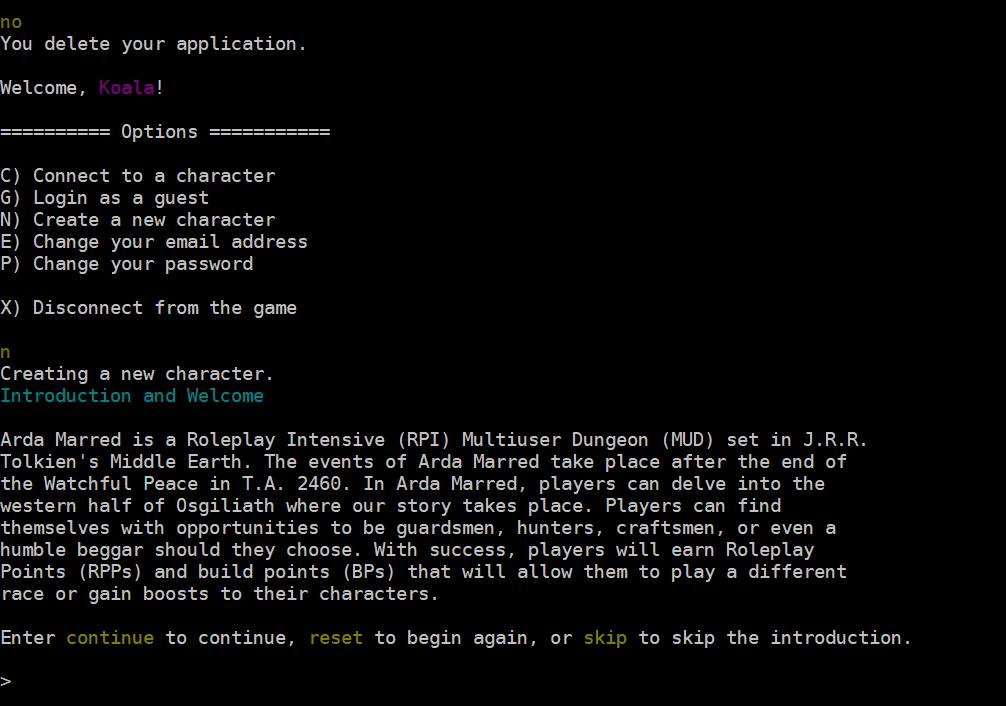
This is where you will be able to read a basic synopsis of Arda Marred and any story that you might need to know. From here, you may continue to read the story, reset your application or skip to the application type. Different types include special, simple or normal. Currently, normal and simple operate in the same manner.
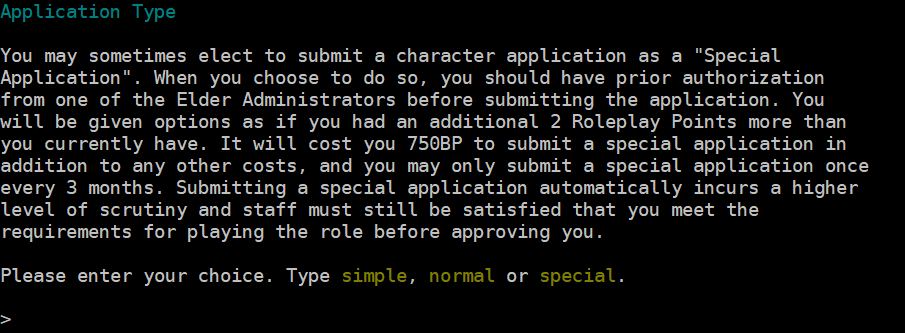
There are 4 main races that can be played within Arda Marred. The four races include human, elf, dwarf, and hobbit. Within those four races are subsets of ethnicities to choose from. As a new player, you will have only one option: Common Gondorian Human that starts with no boosts or special attributes. As you progress and earn Roleplay Points (RPPs) you will open other races. The first non-human race opens at 4 roleplay points. If you do not have the correct number of poitns according to the given list, they will not appear on your selection menu.
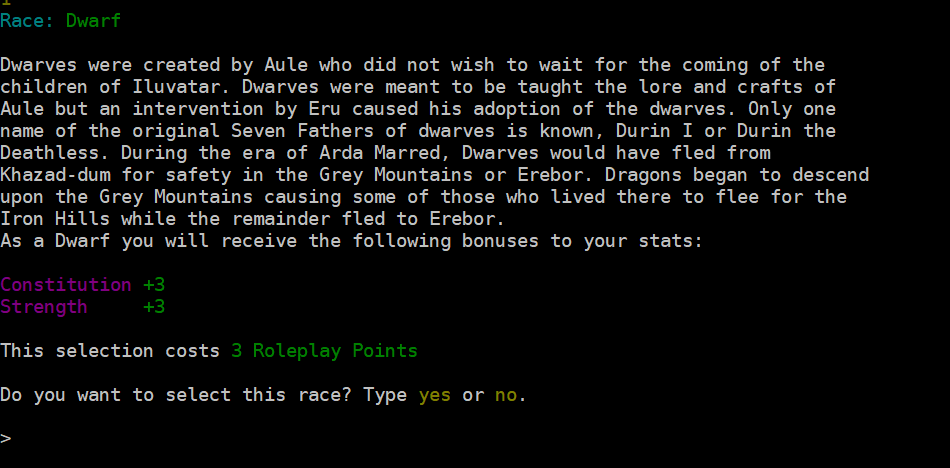
When you select a race, you will receive a description of what that race and the bonuses that the race comes with. For an example, the image below will show you the description of a dwarf.
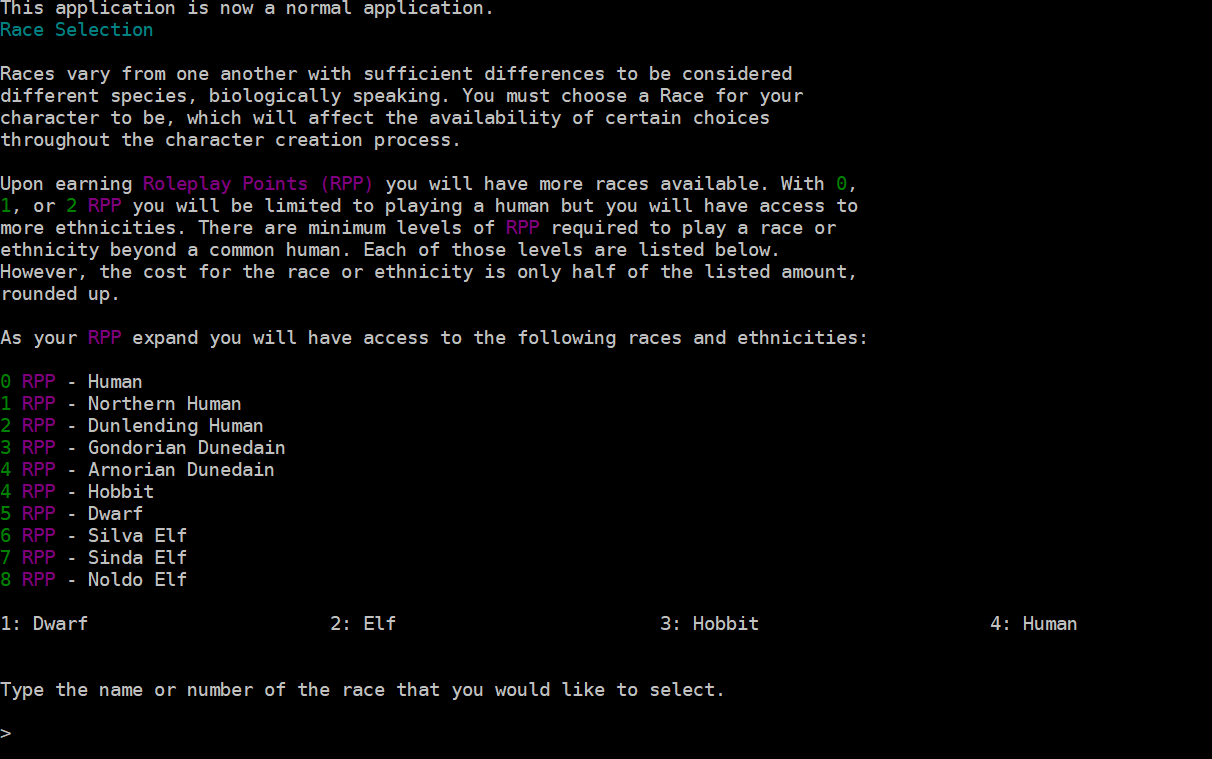
Once you have selected your race, you will enter the ethnicity selection screen. Here you will have an opportunity to select any of the different cultures for your chosen race. The image below gives you an idea of the different options of ethnicities you might have access to. Again, the different ethnicities will not show up until you have the required amount of RPP for that race and ethnicity.
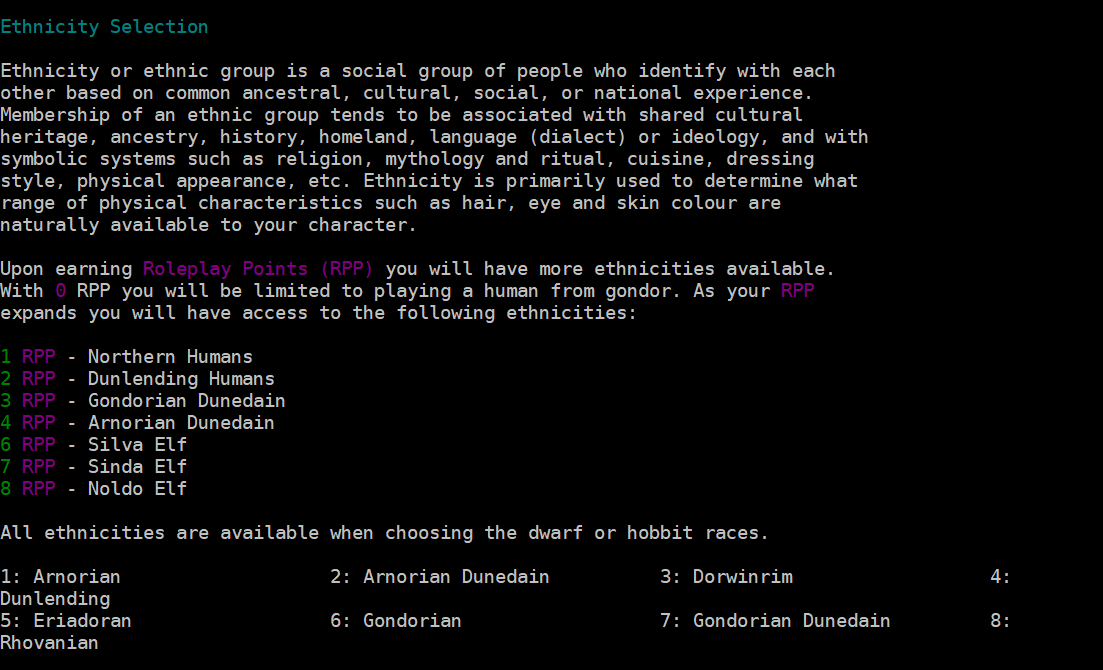
Just like when selecting a race, you will have a chance to confirm the selection of the ethnicity you have chosen. The description of the ethnicity gives you a brief summary of the ethnicity and the bonuses that are included with it. The image below shows what it might be like if you chose an Arnorian Dunedain
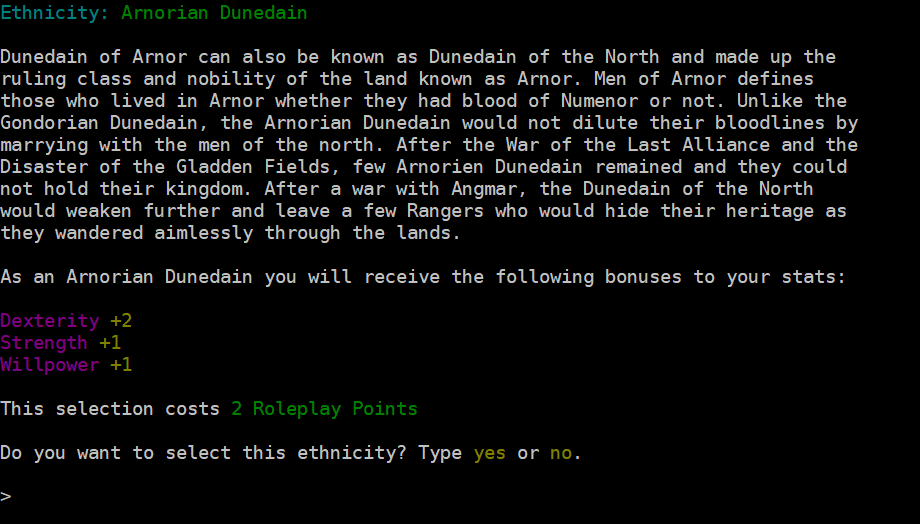
The last thing to consider when choosing a race and ethnicity is the culture which your character might have. There are different choices for each and most of them are purely roleplay relevant. In the images below, you can see an example of the different cultures available to a hobbit.
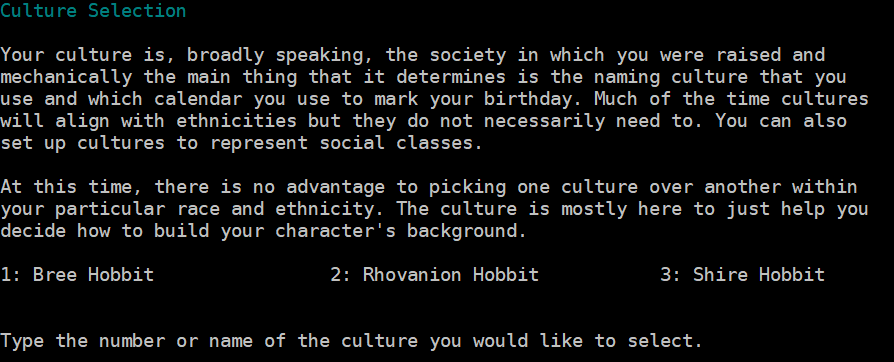

Selecting a role to start with is something completely optional for you. The purpose of a role is to help flesh out what your character might be good at. In addition a role will give boosts toward whatever the character's specializations or goals are. If you are starting out as an apprentice woodworker, you will receive a bonus to your woodcraft skills. The number of roles available will vary with the number of people in game currently filling that role. In order to keep the population diverse, we will try to limit to a certain number of apprentices, journeyman, and artisans. Typically we will only allow one master for each craft set. If you have a request for a role that is not available, feel free to petition the admins to see if the role can become available.

Roles are not just limited to craft sets and players are more than welcome to join the Gondorian Army. There are currently 72 different roles that can be chosen. As you earn RPP, more roles will open. There are apprentice, journeyman, artisan, and master for each craft set and four different roles for the Gondorian Army (Recruit, Private, Sergeant at Arms, and Lieutenant). Just like when selecting a race or ethnicity, there will be a description of the role that shows the different skill and attribute bumps you will receive for selecting that role.

During this stage, you will begin to iron out the more detailed aspects of your character. The items you will have control of during this stage include:
- Right or Left Handed
-
Age
- The age range you can select is based on which race and ethnicity you are.
- Birthday
-
Height
- The height range you can select is based on which race and ethnicity you are.
-
Weight
- The weight range you can select is based on which race and ethnicity you are.
- Name
- Family Name
- Missing Body Parts
During this stage you will be able to select your attributes and in which order they are most important to your character. It is important to consider different skills that might use different attributes. For example, if you are wanting to focus primarily on making cloth goods, you probably dont need to prioritize strength. Or if you are wanting to use a 2 handed weapon, strength might be better than agility. Make sure to check the skills and crafts page in order to best align your character's skills and attributes. For a more detailed description of stats, see the stats page.
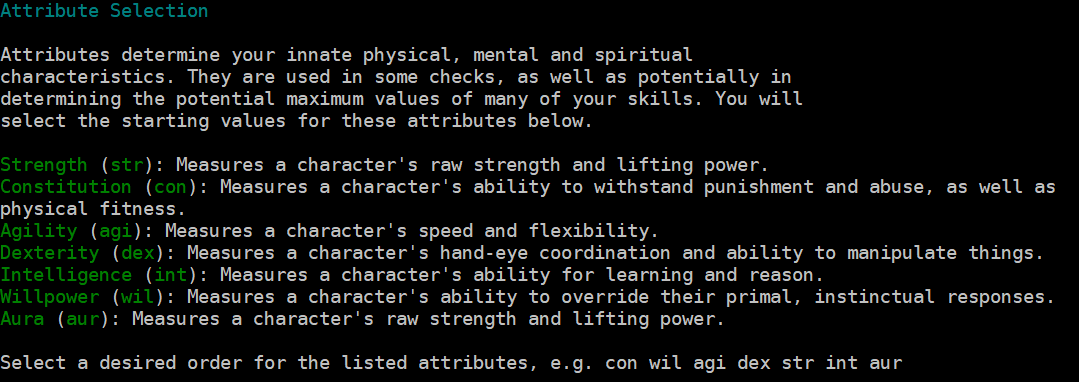
Every race includes a certain set of free skills. In the image below, you can see what it will look like when you create a Gondorian Comman Human. In addtion, some skills are hidden behind others. So, for example, the armourcraft skill will not appear until you take the metalcraft skill. The fewer skills you take, the higher those skills are when you commence into the game. However, you cannot learn more skills in game without significant roleplay with a character who has mastered that skill in game. So, for example, if you do not take a shortbow skill but want to learn it in game you must find someone who has the skill level at master or higher and log role play with that person. Then, the logs must be submitted to staff who will judge whether or not significant roleplay will be enough for that skill to be learned. Of course, each skill will require different levels of role play. An example of this might be shortbow versus stonecrafting. You might be able to learn the basics of a shortbow in one or two sessions, but the stonecraft skill might take five to six sessions.
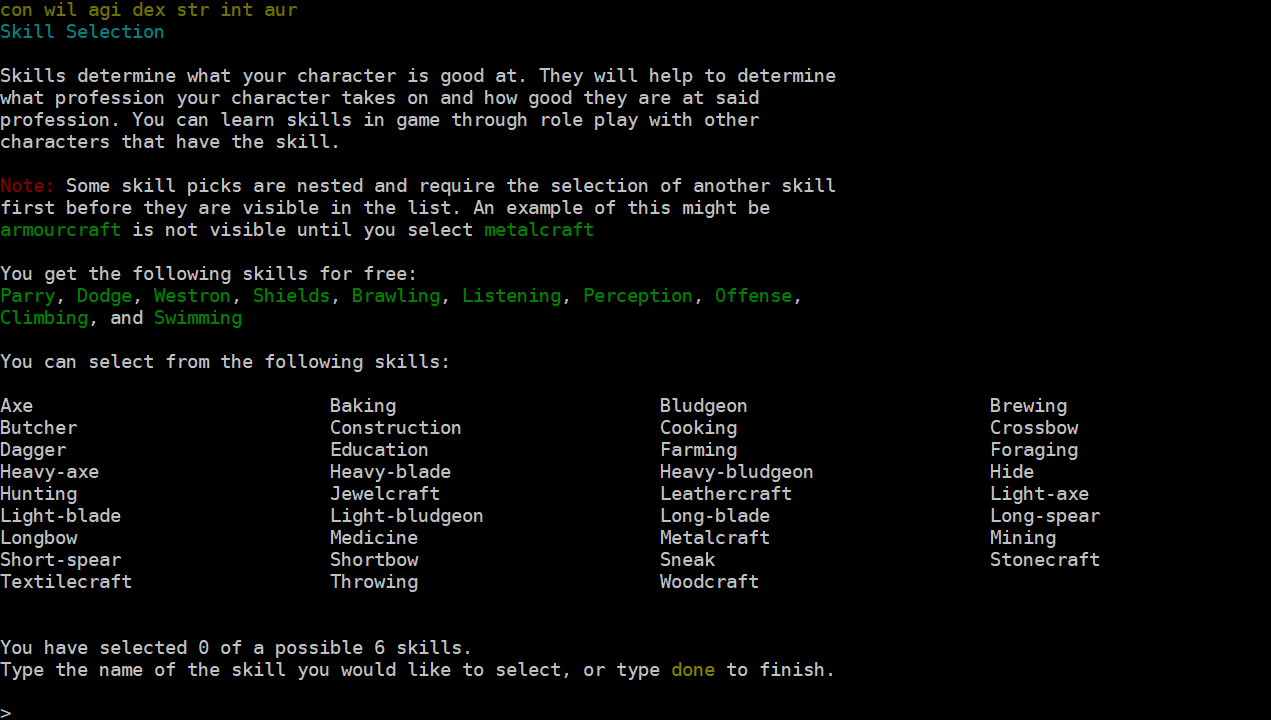
Each race comes with a different set of free skills, higher starting skills, and some skills are even unlocked once you reach a certain RPP level. In addition, higher cost RPP race and ethniticities will allow for selection of additional languages. In the image below, you can see the skills a hobbit would start with, languages that are selectable, and the number of skills they can choose goes up from six to seven.
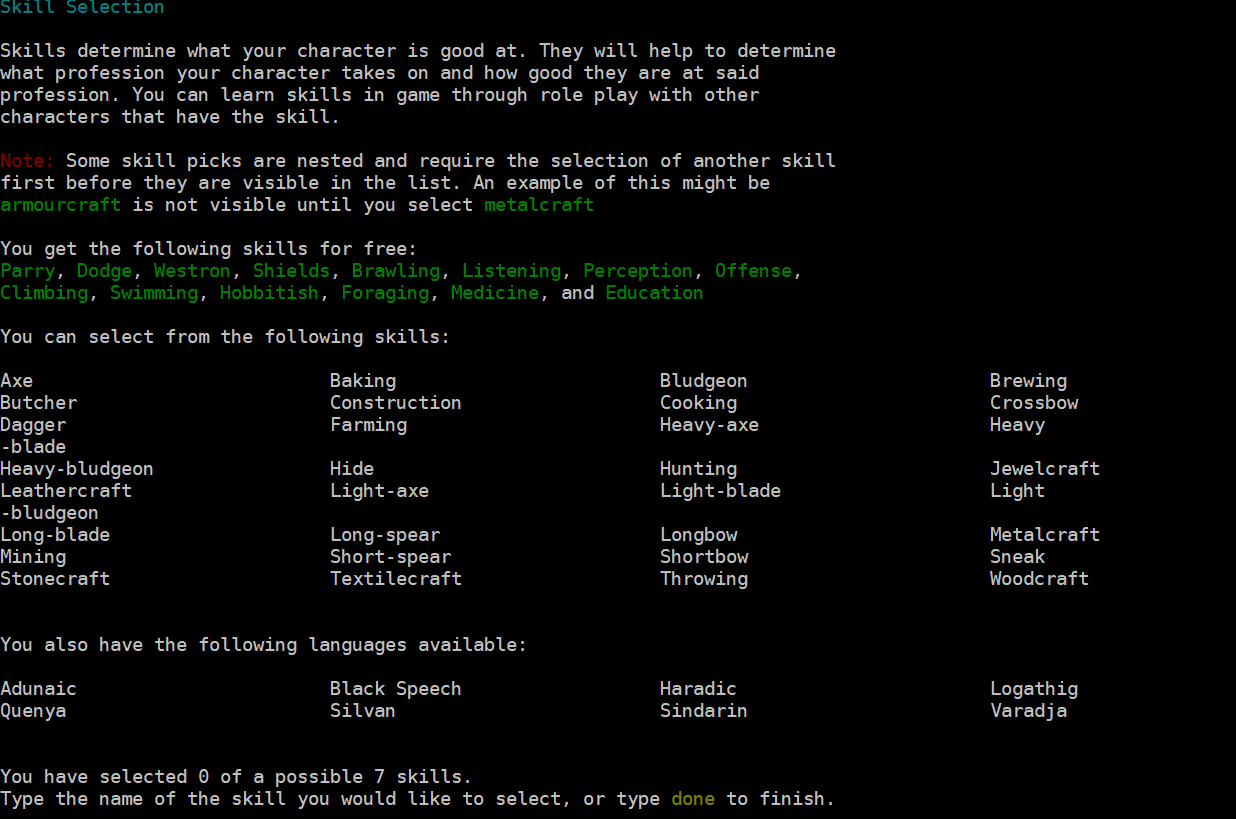
Once you have chosen your skills, you will move on to choosing accents for each of the languages you speak. Mostly this is a roleplay choice but the accent should align with whatever race, ethnicity, and culture you choose. If you have any build points available, you can choose additional accents for each language at ten build points per accent. The image below gives you an example of what choosing accents might be like as a hobbit.
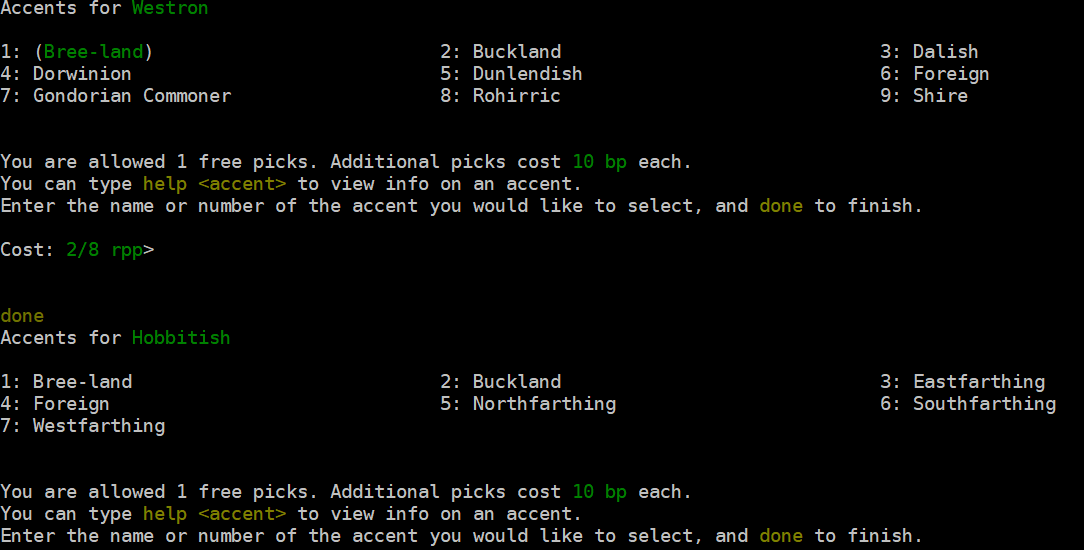
Once you have selected your accents you will be asked to select any knowledges that you might have available. Currently, this selection is only available for anyone who has chosen education as a skill. The education skill allows for two different scripts to be chosen. You are allowed one free pick and additional scripts cost ten build points. Eventually, there will be crafting guilds added to Arda Marred and the knowledges that come with those guild will be added to this list. The image below will show you what the knowledge selection screen will look like.

The last part of this phase is to begin selecting characteristics. Through this process you will have many options to choose from in order to individualize your character. In the image below you can see some of the different categories that the FutureMud Engine will allow you to choose from.
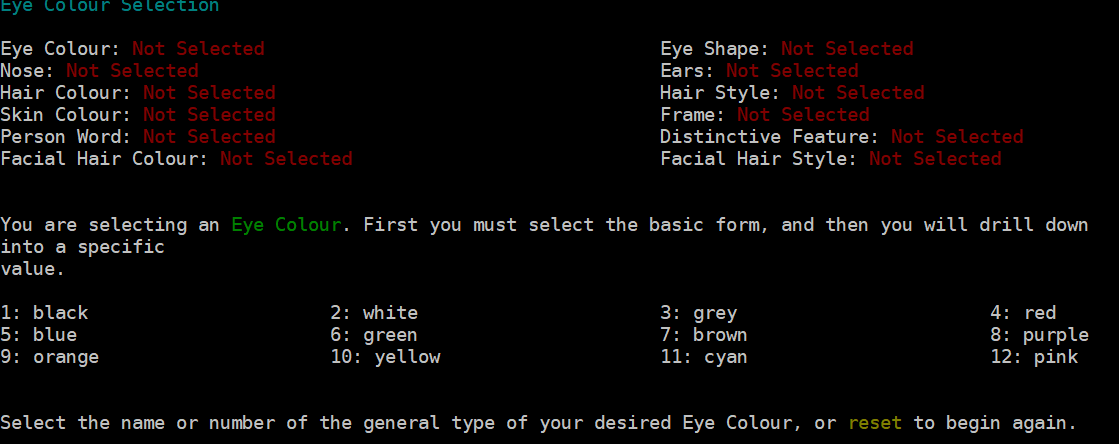
Once you have chosen all of the different characteristics available to you the engine will prompt you with a list of potential short descriptions that you might use. If you do not want to use one of the shor descriptions you do not have to. Instead, you can add a custom short description of your own.

Based on the short description you choose, FutureMud will generate a list of potential full descriptions of your character using the characteristics you have chosen. Again if you choose not to use one of the available descriptions you can always add a custom description of your own.

Currently, there is only one room that you can start in. The Pre-commencement Room will take players to a room where they will diverge on different paths based on their race, ethnicity, or role.

The last step in creating a character is to give them a background. The background of a character might include where they came from, why they left home, what they
did to get to where they are, what motivates them, what their goals are, or anything else that you might imagine would be important for establishing a good character
background.
No. Your character is not the long lost brother of Aaragorn.
